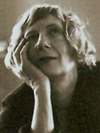
Contributing editor Joan Duncan Oliver has spent the past year immersed in the subject of happiness, first to write a book—Happiness: How to Find It and Keep It—and then to edit a special section for this issue on happiness. Is she happier as a result? “Hard to say. But it convinced me that Buddhist practice gives us a better shot at finding true happiness than anything our consumerist culture urges us to pursue.” What makes her happy? “Friends, books, laughter, the beach—though even these pleasures are fleeting. Ultimately, happiness is about appreciating the moment.”

Erik Hansen (“Moving Target,”) tells us: “On first finding Buddhism, I was ready to chuck everything in favor of a little cubicle in a remote mountain monastery. But my late meditation teacher, Dr. Edward Wortz, assured me that Zen practice could be just as rewarding, and even more challenging, in the midst of this everyday American life. He was right; every moment is ripe for practice. What’s more, I’d have never found my wife, Shannon, in those more exotic locales. She was sitting right across from me in our local meditation group. I feel truly blessed to be with someone who shares this most central of interests and whose perspective and insights always enliven my own.”
 Nina Wise (“Sudden Awakening,”) writes: “When scholar Wendi Adamek told me about the Bao Tang, the radical Buddhist sect who thrived in eighth-century China, I was enraptured not only by the story but also by the precision and depth of Wendi’s understanding. Regrettably, I was unable to include more of her exquisite writing in my article, and I encourage the reader to find Ms. Adamek’s book and read the compelling details of the Bao Tang.”
Nina Wise (“Sudden Awakening,”) writes: “When scholar Wendi Adamek told me about the Bao Tang, the radical Buddhist sect who thrived in eighth-century China, I was enraptured not only by the story but also by the precision and depth of Wendi’s understanding. Regrettably, I was unable to include more of her exquisite writing in my article, and I encourage the reader to find Ms. Adamek’s book and read the compelling details of the Bao Tang.”
 Frank Jude Boccio, whose “Breath and the Body“, tells us: “Ever since learning of the four foundations of mindfulness, I’ve seen yoga practice as not merely complementary but as an essential vehicle for the cultivation of mindfulness, compassion, and equanimity. Yoga can provide a mirror to how we relate to all our experience, because how we relate to what’s happening or not happening on the mat is no different from how we relate to whatever arises throughout our lives. Through practicing yoga postures as meditation, we can see for ourselves what the Buddha taught: Here in this fathom-long body we can penetrate the whole of the dharma. And it can be fun!”
Frank Jude Boccio, whose “Breath and the Body“, tells us: “Ever since learning of the four foundations of mindfulness, I’ve seen yoga practice as not merely complementary but as an essential vehicle for the cultivation of mindfulness, compassion, and equanimity. Yoga can provide a mirror to how we relate to all our experience, because how we relate to what’s happening or not happening on the mat is no different from how we relate to whatever arises throughout our lives. Through practicing yoga postures as meditation, we can see for ourselves what the Buddha taught: Here in this fathom-long body we can penetrate the whole of the dharma. And it can be fun!”